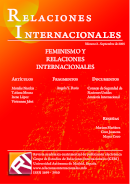Keywords:
women, Post Conflict, reconstruction, feminism, conflict, war, power relations, UNCopyright (c) 2005 Tatiana MOURA

This work is licensed under a Creative Commons Attribution-NonCommercial-NoDerivatives 4.0 International License.
Abstract
The proposals for the analysis of the participation of women in situations of armed conflicts and the impacts of these conflicts in their lives are recent. The analysis began to emerge since the eighties, as a result of the arising of a line of feminist research on peace and violence, and the growing complexity of conflicts over the past fifteen years. But initial proposals have emphasized, in particular, the emergency situations without any clear reference to the process of post-conflict reconstruction, nor an analysis of power relations in societies torn by conflict. (Reimann, 2001).
In its first part, this article analyzes the characteristics of contemporary conflicts and strategies for responding to these conflicts, in particular the post-conflict reconstruction model of the United Nations. The second part examines the feminist proposals for re(de)construction post-conflict, giving some light to the silences and the consequences of models that attempt to rebuilt the past, setting aside requirements, roles and contributions of women during and after armed conflicts.





